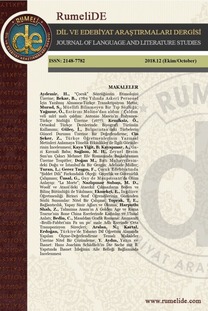A Life in Exile: An Analysis of the Uncanny and National Identity in Yaşar Kemal’s Look, the Euphrates River is Flowing Blood
A Life in Exile: An Analysis of the Uncanny and National Identity in Yaşar Kemal’s Look, the Euphrates River is Flowing Blood
Having a preliminary place and paramount significance among Yaşar Kemal’s historical fiction novels, Look, the Euphrates River is Flowing Blood is the first book of his quartet entitled “An Island Tale” that was published in 1997. Dealing with the ordeal and uncanny feelings of the Anatolian people after the First World War, Yaşar Kemal recounts the material and spiritual destruction caused by the phenomenon of migration both within and beyond the borders in this work. As a result of the Exchange Agreement signed between Turkey and Greece in 1923, the inhabitants of Ant (Mirmingi) Island, were forced to migrate to lands they never knew. With the population exchange decision taken in Lausanne, the Greeks were sent to Greece and it was decided to settle the people who lost their homeland in the wars on this island in the Aegean. With this news, the people of the island experience some stages of queer, uncanny emotions, such as grief, anger, denial, bargaining, depression, and ultimately acceptance, and step into the Greek lands as an exchange. Vasili Atoynatanoğlu, who is a veteran of the Sarıkamış operation, however, did not participate in this forced migration. People from various origins who take refuge on the island, with the support of Poyraz Musa, launch a new life despite all the pain they have experienced. Predominantly based on Freud, Bhabha, and Kristeva’s theories of the uncanny, the paper handles the issues of forced migration between Turkey and Greece and its profound impacts on migrants and local people in the nation-building process of the new Turkish state. The purpose of this paper is to analyse Yaşar Kemal’s Look, the Euphrates River is Flowing Blood through the theories of the “uncanny” and nationalism by highlighting the uncanny presence of characters within the novel.
Keywords:
Yaşar Kemal, Look, the Euphrates River is Flowing Blood, uncanny, nation-state, national identity forced migration,
___
- Akay, Recep (2005). “Kültürel Kimlik ve Kültürlerarası İletişim”. Bilgi, 11: 108-120.
- Anderson, B. (2014). Imagined Communities: Reflections on the Origin and Spread of Nationalism,
- Bakhtin, Michael (1981). The Dialogic Imagination. USA: University of Texas Press.
- Bauman, Zygmunt (2003). Liquid Love: On the Frailty of Human Bonds. Cambridge: Polity Press.
- Beck, U. (2002). ‘The Cosmopolitan Society and Its Enemies’, Theory, Culture and Society, 1-2.
- Bedlek, E. Y. (1990). Imagined Communities in Greece and Turkey: Trauma and the Population Exchanges Under Atatürk, London: IB Tauris.
- Benwell, B. & Stokoe, E. (2011). Discourse and identity. 1-314. 10.1017/CBO978074862653
- Bergson, Henri (2015). Madde ve Bellek. Işık Ergüden (Çev.) Ankara: Dost.
- Bhabha, H. (1994). The Location of Culture, London: Routledge.
- Bhabha, H. (1992). ‘The World and the Home’, Social Text Third World and Post-Colonial Issues.
- Clark, B. (2009). Twice a Stranger: Greece, Turkey and the Minorities they Expelled, Cambridge: Harvard University Press.
- Çulhaoğlu, Tahsin (2017). “Memory in Yaşar Kemal’s Novels”. The Journal of International Social Research. 10:54.
- Freud, Sigmund (2023). The Uncanny. London: Penguin Classics.
- Freud, Sigmund. (1955), ‘The Uncanny’, in J. Strachey et al. (eds.), The Standard Edition of the Complete Psychological Works of Sigmund Freud, vol. XVII, London: Hogarth Press and the Institute for Psycho-Analysis.
- Freud, Sigmund (1919). “The Uncanny”, Imago. Trans. Alix Strachey. Bd. V., 1919; reprinted in Sammlung, Fünfte Folge.
- Golban, T. & Yürükler, E. (2019). Social construction of identity in Louis De Bernières’ novel Birds Without Wings. Humanitas, 7(14).
- Gürsel, Nedim (2000). Yaşar Kemal: Bir Geçiş Dönemi Romancısı [Yaşar Kemal: A Transitional Period Novelist], İstanbul: Everest Yayınları.
- Hirschon, R. (2023). Crossing the Aegean: An Appraisal of the 1923 Compulsory Population Exchange Between Greece and Turkey, New York: Berghan Books.
- Kemal, Yaşar (2022). Fırat Suyu Kan Akıyor Baksana. Bir Ada Hikayesi 1. İstanbul: Yapı Kredi Yayınları.
- Kemal, Y. (2002). Karıncanın su içtiği. Bir ada hikâyesi 2. İstanbul: Adam Yayınevi.
- Kemal, Y. (2005). Ağacın Çürüğü: Yazılar-Konuşmalar [The Rotten Tree: Articles and Speeches, compiled by Alpay Kabacalı], 1980, İstanbul: YKY.
- Kristeva, J. (1991), Strangers to Ourselves, New York: Columbia University Press.
- MacMillan, Catherine (2021). “Narrating the Nation? National Identity and the Uncanny in De Bernières’ Birds Without Wings”, Literature & History, Vol. 30(2).
- MacMillan, Catherine (2021). “The Uncanny and the ‘Great Return’ from Exile: Unheimlich (Un)homecomings in Milan Kundera’s Ignorance”, Litera, 31(1), 121-136.
- Royle, N. (2003). The Uncanny (Manchester: Manchester University Press.
- Sabatos, Charles, D. “The Nation’s ‘Timeless Mission’: Frontier Orientalism in Central European Historical Fiction.” World Literature Studies, Vol. 10, No. 1, 2018.Smith, A. D. (1991). National identity (Vol. 11). Reno: University of Nevada press.Yürükler, Evla (2019). Discourse and Identity in Louis de Bernières’ Novel Birds Without Wings. MA Dissertation. Ziarek, E. (1995). ‘The Uncanny Style of Kristeva’s Critique of Nationalism’, Postmodern Culture 2.
- ISSN: 2148-7782
- Yayın Aralığı: Yılda 6 Sayı
- Başlangıç: 2014
- Yayıncı: Yakup YILMAZ
Sayıdaki Diğer Makaleler
Güncel iş ilanlarında çevirmen profili
Yabancı/ikinci dil öğretiminde farklı yaş gruplarının pedagojisi
Mustafa Kutlu’nun gezi kitaplarına göre İstanbul’u
Anchoring the Past in Virginia Woolf’s To the Lighthouse
On the double use of katiyen in Turkish: A corpus analysis
Modern Arap Şairi Ahmet Matar’ın Lâfitât'ında Epigrâm Sanatı
Ahmet Mithat Efendi’nin kanonist tavrı
